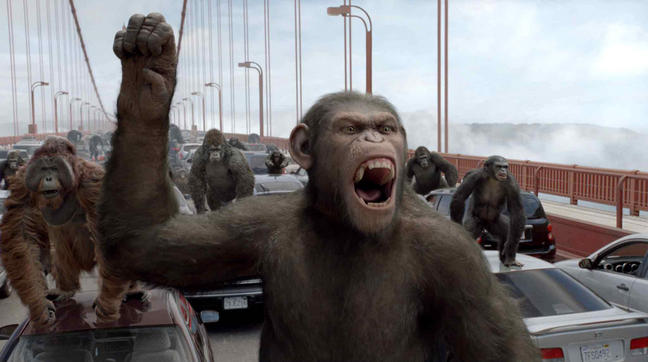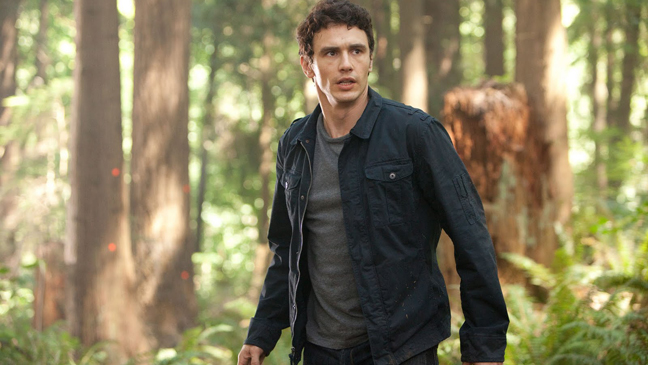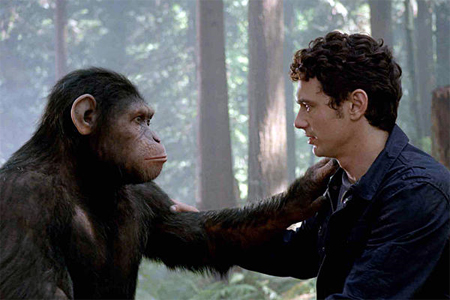“No!”
That’s what I first thought when I saw they were making yet another Planet of the Apes movie. I love the original film starring Charlton Heston and Roddy McDowall. It ranks among the greatest science fiction films of all time because it is well executed, exciting, surprising, and, in its day, timely. The Twilight Zone-like twist at the end of that first Apes film is perhaps even more shocking now that we are decades removed from the Cold War’s ever present nuclear paranoia. In the wake of so many attempts to restart well known film franchises, I feared Hollywood was trying to reimagine The Planet of the Apes.
My fears were unfounded.
 The Rise of the Planet of the Apes does not try to reset the series. Instead, it fulfills the history hinted at in the older films, using the current scientific mileu to explain how the first apes cast aside their subordinate status and began forming their own intelligent society.
The Rise of the Planet of the Apes does not try to reset the series. Instead, it fulfills the history hinted at in the older films, using the current scientific mileu to explain how the first apes cast aside their subordinate status and began forming their own intelligent society.
The sinister science in this film isn’t physics but pharmaceuticals. Will Rodman (James Franco) is a chemist with a father suffering from Alzheimer’s and is searching for a cure for the disease. He is testing his drugs on apes, and one of these apes turns out to be pregnant. The fact that these scientists didn’t realize one of their apes was pregnant might have been reason to question their scientific thoroughness, but nevertheless, the hyper-intelligent DNA is passed on to a new ape generation. An incident involving an angry ape and a room full of investors causes the program to be shut down, and Will decides to raise the baby ape as his own as the infant is the last remaining specimen from his experiments. This ape is Caesar, the eventual leader of the ape revolt.
 This film is much better than I anticipated. Caesar, portrayed via motion capture and CGI by Lord of the Rings alumnus Andy Serkis (Gollum), is the prescient soul of this film, and the moments focusing on him shine. The human characters are all a bit uninteresting, including, unfortunately, James Franco’s Will Rodman, who is the principal human involved in the plot. Franco is usually quite good. In this film he is only a small step beyond catatonic. The apes are so good though, I was able to overlook Franco’s flatness.
This film is much better than I anticipated. Caesar, portrayed via motion capture and CGI by Lord of the Rings alumnus Andy Serkis (Gollum), is the prescient soul of this film, and the moments focusing on him shine. The human characters are all a bit uninteresting, including, unfortunately, James Franco’s Will Rodman, who is the principal human involved in the plot. Franco is usually quite good. In this film he is only a small step beyond catatonic. The apes are so good though, I was able to overlook Franco’s flatness.
Good sci-fi explores current issues in fantastic situations. The original Planet of the Apes is so good partly because it was so pertinent to its time. The 1960s were the decade of African American civil rights and the perils of nuclear proliferation. The original film tackled both these issues using talking apes.
Today, we live in an Era of Rights. Everything from marriage to technological accessibility becomes a “rights” issue in our world, so while Rise is less explicit than the original in what civil rights issue it is tackling, it is no less effective. Similarly, our society is more afraid of genetic engineering than the Bomb, so Rise explores the ramifications of genetic manipulation. As such, Rise is good sci-fi even in its weakest moments. It is also briskly paced, so most audience members won’t notice its flaws.
 Civil Rights, put simply, is how we treat the Other. As Christians, we have the pleasure and the obligation to love everyone, neighbor and enemy alike, as we love ourselves. The Rise of the Planet of the Apes encourages us to do that, and so I applaud the film. It is not the most challenging “love your neighbor as yourself” themed film I’ve seen, but it is focused in that direction.
Civil Rights, put simply, is how we treat the Other. As Christians, we have the pleasure and the obligation to love everyone, neighbor and enemy alike, as we love ourselves. The Rise of the Planet of the Apes encourages us to do that, and so I applaud the film. It is not the most challenging “love your neighbor as yourself” themed film I’ve seen, but it is focused in that direction.
How we ought to use our quickly developing powers of genetic manipulation is also a pressing concern. We need to seriously consider the ethics involved in changing who we are at the most basic physiological level. There is great potential in these advancements both for good and for harm. The Rise of the Planet of the Apes encourages us to consider what we are doing and what it might mean for the whole planet. Should we, like the first speaking ape of Planet legend, cry out with a resounding “No!” or ought we to voice a more quiet and cautious “Yes.”?
Now is the time for that conversation to happen, not after we either blow ourselves to bits with a bomb or deconstruct ourselves beyond recognition bit by DNA bit.

